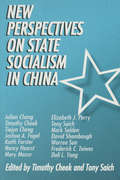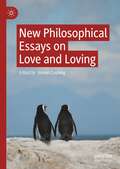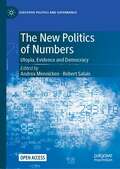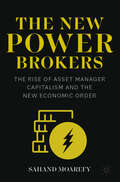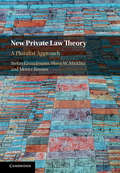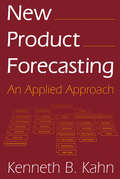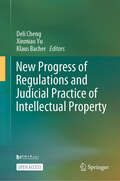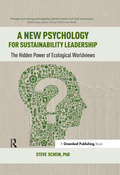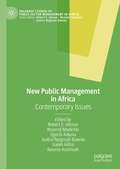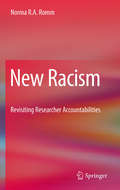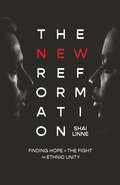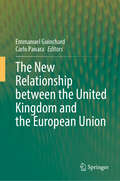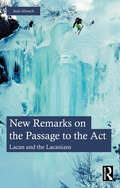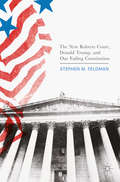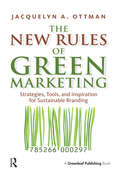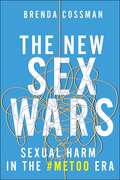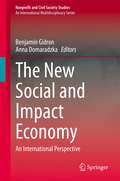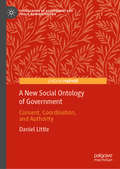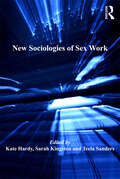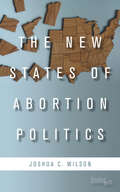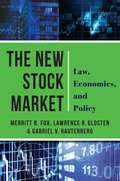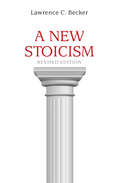- Table View
- List View
New Perspectives on State Socialism in China
by Timothy Cheek Tony SaichPlacing Chinese Community Party history in the realm of social history and comparative politics, this text studies the roots of the policy failures of the late Maoist period and the tenacity of the CCP.
New Philosophical Essays on Love and Loving
by Simon CushingNew philosophical essays on love by a diverse group of international scholars. Topics include contributions to the ongoing debate on whether love is arational or if there are reasons for love, and if so what kind; the kinds of love there may be (between humans and artificial intelligences, between non-human animals and humans); whether love can explain the difference between nationalism and patriotism; whether love is an necessary component of truly seeing others and the world; whether love, like free will, is “fragile,” and may not survive in a deterministic world; and whether or not love is actually a good thing or may instead be a force opposed to morality. Key philosophers discussed include Immanuel Kant, Iris Murdoch, Bernard Williams, Harry Frankfurt, J. David Velleman, Niko Kolodny, Thomas Hurka, Bennett Helm, Alfred Mele and Derk Pereboom. Essays also touch on the treatment of love in literature and popular culture, from Graham Greene’s The End of the Affair to Spike Jonze’s movie her.
The New Politics of Immigration and the End of Settler Societies
by Catherine DauvergneOver the past decade, a global convergence in migration policies has emerged, and with it a new, mean-spirited politics of immigration. It is now evident that the idea of a settler society, previously an important landmark in understanding migration, is a thing of the past. What are the consequences of this shift for how we imagine immigration? And for how we regulate it? This book analyzes the dramatic shift away from the settler society paradigm in light of the crisis of asylum, the fear of Islamic fundamentalism, and the demise of multiculturalism. What emerges is a radically original take on the new global politics of immigration that can explain policy paralysis in the face of rising death tolls, failing human rights arguments, and persistent state desires to treat migration as an economic calculus.
The New Politics of Numbers: Utopia, Evidence and Democracy (Executive Politics and Governance)
by Andrea Mennicken Robert SalaisThis open access book offers unique insight into how and where ideas and instruments of quantification have been adopted, and how they have come to matter. Rather than asking what quantification is, New Politics of Numbers explores what quantification does, its manifold consequences in multiple domains. It scrutinizes the power of numbers in terms of the changing relations between numbers and democracy, the politics of evidence, and dreams and schemes of bettering society. The book engages Foucault inspired studies of quantification and the economics of convention in a critical dialogue. In so doing, it provides a rich account of the plurality of possible ways in which numbers have come to govern, highlighting not only their disciplinary effects, but also the collective mobilization capacities quantification can offer. This book will be invaluable reading for academics and graduate students in a wide variety of disciplines, as well as policymakers interested in the opportunities and pitfalls of governance by numbers.
The New Power Brokers: The Rise of Asset Manager Capitalism and the New Economic Order
by Sahand MoarefyOver the course of the last 70 years, asset managers⸺from activist hedge funds to large passive index fund providers⸺have come to own the substantial majority of corporate equities in the United States, and have wielded that ownership to fundamentally reshape the economy. For most of American history, investing was simple: you purchased shares and left the operation of the company to management. If you were dissatisfied with the firm’s performance, you sold your shares. With the rise of asset managers, shareholders now attempt to directly change the companies in which they invest. The New Power Brokers chronicles the economic, legal and technological changes at the heart of this transformation in our public markets, and provides fresh perspectives on what those changes mean for corporations, investors and society as a whole.
New Private Law Theory: A Pluralist Approach
by Stefan Grundmann Hans Micklitz Moritz RennerNew Private Law Theory opens a new pathway to private law theory through a pluralistic approach. Such a theory needs a broad and stable foundation, which the authors have built here through a canon of nearly seventy texts of reference. This book brings these different texts from different disciplines into conversation with each other, grouping them around central questions of private law and at the same time integrating them with the legal doctrinal analysis of example cases. This book will be accessible to both experienced and early career scholars working on private law.
New Product Forecasting: An Applied Approach
by Kenneth B. KahnConcise and jargon free, this is a one-step primer on the tools and techniques of forecasting new product development. Equally useful for students and professionals, the book is generously illustrated, and features numerous current real-world industry cases and examples. Part I covers the basic foundations and processes of new product forecasting, and links forecasting to the broader processes of new product development and sales and operations planning. Part II includes detailed, step-by-step techniques of new product forecasting, from judgmental techniques to regression analysis. Each chapter in this section begins with the most basic techniques, then progresses to more advanced levels. Part III addresses managerial considerations of new product forecasting, including postlaunch issues such as cannibalization and supercession. The final chapter presents an important set of industry best practices and benchmarks.
The New Professional Service Firm: How Consultants, Accountants, and Lawyers Need to Reinvent Themselves (Business Guides on the Go)
by L. Martin van der Mandele Henk W. Volberda Rob B. WagenaarThe authors of this book alert that professional services like law, accountancy, and consultancy firms are set to face major disruption. The most important driver and enabler are the new technologies that help and in part substitute the work done by professionals. The second important disruptor is the new generation of professionals – “NewGen” – who are less interested in building their careers in a hierarchical organization and more interested in entrepreneurial challenges in small teams, with more rapid returns. In the meanwhile, major service conglomerates – the “big four” accounting firms, the “big three” consulting firms to name a few examples – build their network using their brand and substantial resources. All along, the relentless pressure from clients to receive more services at lower cost continues. Medium-sized professional firms as well as one-person independents appear to suffer most from these disruptions and are most anxious to find new ways to conduct their business. But the leaders of large firms also feel that they are increasingly unable to support the innovative entrepreneurship of their most promising professionals while their organizations institutionalize and their overheads continue to grow. This book proposes a new orientation and model of a professional service firm as an answer to these challenges, by creating a Professional Service Community. It is a synergistic team of organizations that share a vision of their role in society and main lines of their mission as well as the quality of their deliverables and their key clients. At the same time, they are independent in designing their internal business models – like recruitment, training, knowledge management, and economics. The Professional Service Community provides a unique and highly attractive level of entrepreneurship, flexibility, and efficiency to the benefit of its clients, partners, staff, and other stakeholders. It is the way of the future.
New Progress of Regulations and Judicial Practice of Intellectual Property
by Deli Cheng Xinmiao Yu Klaus BacherThis open access book brings together two types of cases at home and abroad. One is the latest influential cases in the field of intellectual property rights in the past three years, and the other is the classic intellectual property cases in the world. The types of cases involve typical cases in the fields of patents, trademarks, copyrights, unfair competition, etc., involving a wide range of intellectual property laws and a complete range of categories. Some cases have been a sensation, and some legal issues have been raised or clarified for the first time in relevant judgments. Many cases not only have a wide range of social influence but also have typical legal application significance. Many cases involve facts and legal issues that go beyond the case and the adjudication itself and have greater reference significance. At the same time, we also attached the different opinions of some case judgments, such as the Concurring Opinion and the Dissenting Opinion in the US judgment, reflecting the different understandings of different judges on the application of the law. This part is also very meaningful.
A New Psychology for Sustainability Leadership: The Hidden Power of Ecological Worldviews
by Steve ScheinDuring the last decade, the sustainability position in multinational corporations has grown in influence. Much literature has explored how corporations can play an important role in solving the environmental challenges facing the planet. However, until now, there has been little research on sustainability leadership at the individual level. In this book, Schein explores the deeper psychological motivations of sustainability leaders. He shows how these motivations relate to overall effectiveness and capacity to lead transformational change and he explores the ways in which the complexity of sustainability is driving new approaches to leadership.Drawing on interviews with 75 leaders from over 40 multinational corporations and NGOs, Schein explores how ecological worldviews are developed and expressed in global sustainability practice. By applying key theories from developmental psychology, integral ecology and eco-psychology to sustainability practice, Schein encourages us to think about leadership in a different way. A New Psychology for Sustainability Leadership will be of interest to an interdisciplinary audience of social scientists, educators, corporate executives, and social entrepreneurs. The insights from this book can be usefully integrated into leadership curriculum and development programs to help the next generation of leaders respond to global challenges.
New Public Management in Africa: Contemporary Issues (Palgrave Studies of Public Sector Management in Africa)
by Robert E. Hinson Nnamdi Madichie Ogechi Adeola Justice Nyigmah Bawole Isaiah Adisa Kwame AsamoahThis book analyses and evaluates the accomplishments, challenges, and approaches associated with the New Public Management (NPM) in Africa towards establishing context-specific interventions for public sector institutions' performance. Taking the reader through various business and management approaches, including leadership in the public sector, digitalisation, market orientation and trust building, this book provides an understanding of the key issues facing public sector organisations in Africa and offers novel ways of approaching public management in a changing socio-economic landscape to drive improved performance of public institutions.The book offers students, practitioners and researchers important insights on NPM and public sector institutions in Africa. The recommendations of the book will help government and policymakers implement appropriate public sector management policies for strengthening public sector service delivery in Africa.
New Racism
by Norma RommThis book develops a debate around responsible social inquiry into new racism. A variety of ways of researching new forms of racism (for example, aversive, modern, cultural, purportedly color-blind, and new racism) are addressed. Experiments that have been undertaken to inquire into group identity and people's implicit bias in relation to those perceived as "other" are critically explored and their potential consequences reconsidered. The book also critically explores survey research, which, it is argued, can serve to reinforce the notion of the existence of ethnoracial groups with defined boundaries that inhere in social life. The book considers interviewing (including focus group interviewing) and case study research (including participant observation/ethnography) in terms of possibilities for moving beyond new forms of racism. Action research (defined by the understanding of an inextricable link between knowing and acting) is examined in-depth in terms of the hopes to "make a difference" at the moment of inquiry. Types of retroductive logic that are used to examine underlying structures that arguably unduly constrain people's life chances and render human relationships inhumane are also explored. The book draws together the different arguments; and it proposes ways in which the design of research into new racism can better approached as well as ways in which dialogue around processes of inquiry and the products thereof can be better fostered. Suggestions for nurturing humane social relationships that provide for transcultural meaning-making are threaded through the text.
The New Reformation: Finding Hope in the Fight for Ethnic Unity
by Shai LinneIn the sixteenth century, the church faced a doctrinal crisis. Today, the crisis is race.We all know that racial unity is important. But what&’s the right way to approach it? How can Christians of different ethnicities pursue unity in an environment that is so highly charged and full of landmines on all sides?In The New Reformation, Christian hip-hop artist Shai Linne shows how the gospel applies to the pursuit of ethnic unity. When it comes to ethnicity, Christians today have to fight against two tendencies: idolatry and apathy. Idolatry makes ethnicity ultimate, while apathy tends to ignore it altogether. But there is a third way, the way of the Bible. Shai explains how ethnicity—the biblical word for what we mean by &“race&”—exists for God&’s glory.Drawing from his experience as an artist-theologian, church planter, and pastor, Shai will help you chart a new way forward in addressing the critical question of what it means for people of all ethnicities to be the one people of God.
The New Reformation: Finding Hope in the Fight for Ethnic Unity
by Shai LinneIn the sixteenth century, the church faced a doctrinal crisis. Today, the crisis is race.We all know that racial unity is important. But what&’s the right way to approach it? How can Christians of different ethnicities pursue unity in an environment that is so highly charged and full of landmines on all sides?In The New Reformation, Christian hip-hop artist Shai Linne shows how the gospel applies to the pursuit of ethnic unity. When it comes to ethnicity, Christians today have to fight against two tendencies: idolatry and apathy. Idolatry makes ethnicity ultimate, while apathy tends to ignore it altogether. But there is a third way, the way of the Bible. Shai explains how ethnicity—the biblical word for what we mean by &“race&”—exists for God&’s glory.Drawing from his experience as an artist-theologian, church planter, and pastor, Shai will help you chart a new way forward in addressing the critical question of what it means for people of all ethnicities to be the one people of God.
The New Relationship between the United Kingdom and the European Union
by Carlo Panara Emmanuel GuinchardBrexit has reshuffled the cards of the relationship between the United Kingdom and the European Union. It is a one in a lifetime event, which ended nearly 50 years of EU Membership. EU law as such no longer applies in the United Kingdom and British citizens and companies no longer benefit from its advantages. Part of the previous regime has however been maintained (at times with amendments) through the series of treaties negotiated between the UK and the EU in 2019 and 2020, in particular the Trade and Cooperation Agreement of 2020, to which the 2023 Windsor Agreement can be added. The end result is a legal regime which is perhaps even more complex than EU law itself. This book aims to provide the reader with a clarification of this legal regime as well as provide context to it and suggestions to improve it. All key topics are covered, such as citizens of the EU in the UK and British citizens in the EU, trade in goods and in services, criminal justice, public procurement, Northern Ireland, the UK overseas territories, the dispute settlement, security and defence, international trade agreements of the UK post-Brexit, environmental protection, European civil justice, financial services, education and research, and the European offices of the UK local authorities and devolved administrations after Brexit. All the chapters follow, wherever possible, the same triadic structure. The first part looks at the regime prior to Brexit; the second part analyses the current regime; and the third part discusses ongoing and predictable trends. The concluding chapter attempts to identify some themes likely to impact on the forthcoming preparation of the 2026 review.
New Remarks on the Passage to the Act: Lacan and the Lacanians
by null Jean AllouchNew Remarks on the Passage to the Act considers what happens when psychoanalysis and the social sciences are called on to help modern societies overwhelmed by unexplained violence.Jean Allouch examines key events – the crimes of the Papin sisters, Lacan’s case of Aimée and the murder of Hélène Rytmann by Louis Althusser – and unpacks the concept of the "passage to the act". The book assesses these classic cases, resorting to contemporaneous studies and literature, particularly discussing Marguerite Duras’ novel L’Amante Anglaise. The book also considers modern acts of terrorism.New Remarks on the Passage to the Act will be of great interest to clinicians, academics and scholars of psychoanalysis, Lacanian studies, sociology, cultural studies and philosophy, and to Lacanian analysts in practice and in training.
The New Roberts Court, Donald Trump, and Our Failing Constitution
by Stephen M. FeldmanThis book examines what Supreme Court Justice Antonin Scalia's death and Judge Neil Gorsuch's appointment means for the future of democracy in America. Before Scalia's death, the five conservative justices of the Roberts Court--John Roberts, Clarence Thomas, Samuel Alito, Anthony Kennedy, and Antonin Scalia--stamped a capitalized version of democracy, discussed in this book as Democracy, Inc. , with a constitutional imprimatur. The justices believed they were upholding the American way of life, but they instead placed our democratic-capitalist system in its gravest danger since World War II. Democracy, Inc. not only contravenes the framers' vision of a system balanced between the public and private spheres, government power and individual rights, but also threatens the very survival of American constitutionalism. With the looming confirmation of Gorsuch, the new Court must choose: will it follow the early Roberts Court in approving and bolstering Democracy, Inc. , or will it restore the crucial balance between the public and private spheres in our democratic-capitalist system?
The New Rules of Green Marketing: Strategies, Tools, and Inspiration for Sustainable Branding
by Jacquelyn OttmanFor too long, marketers of sustainable goods and services have targeted "deep green" consumers to promote their products – and they have little to show for their efforts. In this innovative book, Jacquelyn Ottman shows how the green market has moved beyond such niche marketing, and how marketers will find greater success promoting the inherent superior value of their offerings. Greener products are now available within every industry and are a part of our everyday lives. But they didn't get to be so ubiquitous just because they are better for the planet. Whether they were promoted as such or not, sales of green products have grown so fast because of the added value they provide: health, superior performance, good taste, cost-effectiveness, or simply convenience. This central emphasis on primary benefits – the new rules – is critical to winning over the mainstream consumer and to driving overall organizational growth. The New Rules of Green Marketing helps readers understand why value-based sustainability marketing has become a critical organizational capacity, and how readers can adopt this approach in their own organizations. Illustrated by examples from both international mainstream and the more niche "deep green" leaders who are showing everyone else the way, the book provides practical strategies, tools and inspiration for building every aspect of a credible value-based green marketing strategy, including:How to use a proactive approach to sustainability to spur innovationHow to frame environment-related benefits with relevance to mainstream brandsHow to communicate with credibility and impact – and avoid "greenwashing"How to team up with stakeholders to maximize outreach to consumersHow to use a life cycle orientation to ensure the integrity of one's offeringsHow to best take advantage of recent technological advances in social mediaDrawing on the latest data from leading researchers and reflecting on learnings from Ottman's corporate clients and other pioneers including GE, Nike, HSBC, Method, Starbucks, Timberland, HP, NatureWorks, Philips, Procter & Gamble, Stonyfield Farm and Wal-Mart, this book shows how market leaders are edging out the competition using effective value-first marketing strategies. This book captures the best of the author's previous groundbreaking books on green marketing and takes the content into the 21st century. Whereas earlier works focused on readers who were less familiar with green initiatives, this work squarely focuses on a new generation of marketers who likely themselves grew up with an appreciation of sustainability and who want and need to know how to connect effectively with mainstream consumers.
The New Sex Wars: Sexual Harm in the #MeToo Era
by Brenda CossmanRevisits the sex wars of the 1970s and ’80s and examines their influence on how we think about sexual harm in the #MeToo era#MeToo’s stunning explosion on social media in October 2017 radically changed—and amplified—conversations about sexual violence as it revealed how widespread the issue is and toppled prominent celebrities and politicians. But, as the movement spread, a conflict emerged among feminist supporters and detractors about how punishment should be doled out and how justice should be served. The New Sex Wars reveals that these clashes are nothing new. Delving into the contentious debates from the ’70s and ‘80s, Brenda Cossman traces the striking echoes in the feminist divisions of this earlier period. In exploring the history of past conflicts—the resistance to finding common ground, the media’s pleasure in portraying the debates as polarized cat fights, the simplification of viewpoints as pro- and anti-sex—she shows how they have come to shape the #MeToo era. From the ’70s to today, Cossman examines tensions between the need for recognition and protection under the law, and the colossal and ongoing failure of that law to redress historic injustice. By circumventing law altogether, #MeToo has led us to question whether justice can be served outside of the courtroom. Cossman argues for a different way forward—one based on reparative models that focus on shared desired outcomes and the willingness to understand the other side. Thoughtful and compelling, The New Sex Wars explores what can been learned from these stories, what traps we repeatedly fall into, how we have been denied our anger, and where to begin to make law work.
The New Social and Impact Economy: An International Perspective (Nonprofit and Civil Society Studies)
by Benjamin Gidron Anna DomaradzkaThis edited volume discusses the development of the new social and impact economy in ten countries around the globe. The new social and impact economy is an attempt to conceptualize developments after the 2008 economic crisis, which emphasized the pifalls of the Neo-Liberal economic system. In the aftermath of the crisis, new organizational entities evolved, which combined social and business objectives as part of their mission. Using data gathered by two recent international research projects—the ICSEM project and the FAB-MOVE project—the book provides an initial portrait of the forces at play in the evolution of the new social and impact economy, linking those to the past crisis as well as to Covid19 and comparing the emergence of the phenomenon in a varied group of countries. The book begins with an overview of the classical definitions of social economy and proposes a comprehensive concept of new social and impact economy, its characteristics, and sources. Ten country chapters as well as a comparative chapter on international social economy organizations follow. The volume concludes with an overall analysis of the data from the country chapters, forming a typology of social economy traditions and linking it to recent Post Capitalism trends. Creating a conceptual framework to analyze the new phenomena in social economy, this volume is ideal for academics and practitioners in the fields of social economy; social, economic and welfare policies; social and business entrepreneurship in a comparative fashion; social and technological innovation as well as CSR specialists and practitioners.
A New Social Ontology of Government: Consent, Coordination, and Authority (Foundations of Government and Public Administration)
by Daniel LittleThis book provides a better understanding of some of the central puzzles of empirical political science: how does “government” express will and purpose? How do political institutions come to have effective causal powers in the administration of policy and regulation? What accounts for both plasticity and perseverance of political institutions and practices? And how are we to formulate a better understanding of the persistence of dysfunctions in government and public administration – failures to achieve public goods, the persistence of self-dealing behavior by the actors of the state, and the apparent ubiquity of corruption even within otherwise high-functioning governments?
New Sociologies of Sex Work
by Kate Hardy Sarah KingstonSex work studies have seen an expansion in publications over the past decade, drawing together disciplines from across the social sciences, namely sociology, criminology and social policy. There has, however, been a tendency for research and writing to focus on the more obvious aspect of the sex industry - the visible elements of female street prostitution and those features which attract media attention such as the criminalised aspects of the sex trade. The sex industry is diverse in terms of its organisation, presentation, participants and how it is located in the broader context of globalisation and regulation; there is a need for publications which demonstrate this breadth. This book makes an outstanding contribution to the sociology of sex work through advancing theoretical, policy, methodological and empirical ideas as each chapter pushes the boundaries of a specific area by offering new and critical research as well as commentary.
The New States of Abortion Politics
by Joshua WilsonThe 2014 Supreme Court ruling on McCullen v. Coakley striking down a Massachusetts law regulating anti-abortion activism marked the reengagement of the Supreme Court in abortion politics. A throwback to the days of clinic-front protests, the decision seemed a means to reinvigorate the old street politics of abortion. The Court's ruling also highlights the success of a decades' long effort by anti-abortion activists to transform the very politics of abortion. The New States of Abortion Politics, written by leading scholar Joshua C. Wilson, tells the story of this movement, from streets to legislative halls to courtrooms. With the end of clinic-front activism, lawyers and politicians took on the fight. Anti-abortion activists moved away from a doomed frontal assault on Roe v. Wade and adopted an incremental strategy--putting anti-abortion causes on the offensive in friendly state forums and placing reproductive rights advocates on the defense in the courts. The Supreme Court ruling on Whole Woman's Health v. Hellerstedt in 2016 makes the stakes for abortion politics higher than ever. This book elucidates how--and why.
The New Stock Market: Law, Economics, and Policy
by Merritt B. Fox Lawrence Glosten Gabriel RauterbergThe U.S. stock market has been transformed over the last twenty-five years. Once a market in which human beings traded at human speeds, it is now an electronic market pervaded by algorithmic trading, conducted at speeds nearing that of light. High-frequency traders participate in a large portion of all transactions, and a significant minority of all trade occurs on alternative trading systems known as “dark pools.” These developments have been widely criticized, but there is no consensus on the best regulatory response to these dramatic changes.The New Stock Market offers a comprehensive new look at how these markets work, how they fail, and how they should be regulated. Merritt B. Fox, Lawrence R. Glosten, and Gabriel V. Rauterberg describe stock markets’ institutions and regulatory architecture. They draw on the informational paradigm of microstructure economics to highlight the crucial role of information asymmetries and adverse selection in explaining market behavior, while examining a wide variety of developments in market practices and participants. The result is a compelling account of the stock market’s regulatory framework, fundamental institutions, and economic dynamics, combined with an assessment of its various controversies. The New Stock Market covers a wide range of issues including the practices of high-frequency traders, insider trading, manipulation, short selling, broker-dealer practices, and trading venue fees and rebates. The book illuminates both the existing regulatory structure of our equity trading markets and how we can improve it.
A New Stoicism
by Lawrence C. BeckerWhat would stoic ethics be like today if stoicism had survived as a systematic approach to ethical theory, if it had coped successfully with the challenges of modern philosophy and experimental science? A New Stoicism proposes an answer to that question, offered from within the stoic tradition but without the metaphysical and psychological assumptions that modern philosophy and science have abandoned. Lawrence Becker argues that a secular version of the stoic ethical project, based on contemporary cosmology and developmental psychology, provides the basis for a sophisticated form of ethical naturalism, in which virtually all the hard doctrines of the ancient Stoics can be clearly restated and defended. Becker argues, in keeping with the ancients, that virtue is one thing, not many; that it, and not happiness, is the proper end of all activity; that it alone is good, all other things being merely rank-ordered relative to each other for the sake of the good; and that virtue is sufficient for happiness. Moreover, he rejects the popular caricature of the stoic as a grave figure, emotionally detached and capable mainly of endurance, resignation, and coping with pain. To the contrary, he holds that while stoic sages are able to endure the extremes of human suffering, they do not have to sacrifice joy to have that ability, and he seeks to turn our attention from the familiar, therapeutic part of stoic moral training to a reconsideration of its theoretical foundations.
